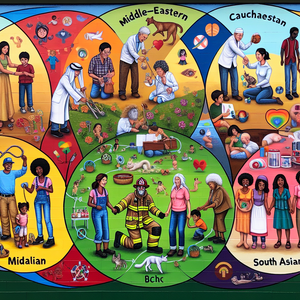Uncharted Realms in Your Backyard: Discovering Hidden Gems Near You

One of the most rewarding aspects of local exploration is discovering the hidden natural beauty in your area. Many towns are surrounded by parks, nature reserves, and walking trails that often go unnoticed. Instead of heading to a well-known national park hundreds of miles away, consider exploring a local nature reserve. These spots often offer breathtaking views, diverse wildlife, and peaceful landscapes. Take, for example, the story of Sarah, a resident of a bustling suburban neighborhood. One weekend, she decided to venture out to the nearby Willow Creek Nature Preserve. What she found was a serene environment filled with wildflowers, a gentle stream, and a variety of bird species. Not only did she enjoy a day immersed in nature, but she also discovered a community of fellow nature enthusiasts who share her passion for local wildlife. This experience is a reminder that nature does not have to be grand to be beautiful; sometimes, the most enchanting places are right around the corner.
Unveiling Historical Landmarks
Historical landmarks are another source of hidden gems that can deepen our understanding of local heritage. Many communities boast lesser-known sites that tell the rich stories of their past. From abandoned railway stations to historic homes turned museums, these locations can provide fascinating insights into the lives that shaped our communities. Consider the example of a small town in the Midwest that features a century-old grain elevator, which, despite being overlooked, represents the agricultural history of the area. A local historian organizes tours and talks about the elevator’s significance, drawing in residents who had never thought to explore this piece of their town’s past. By highlighting these stories, communities can foster a deeper connection with their history and encourage pride in local achievements. Engaging with historical landmarks allows residents to reflect on their roots, creating a sense of belonging and continuity in a rapidly changing world.
Cultural Treasures Awaiting Discovery
Cultural treasures often lie hidden in the form of art installations, local festivals, or community workshops. Engaging with local artists and artisans not only supports the economy but also enriches the community’s cultural fabric. Small galleries, craft fairs, and local performances can be fantastic opportunities to experience the creative spirit of your community. For instance, a local artist may host a pottery workshop in the back of their studio, inviting residents to learn the art of ceramics. Such experiences can spark creativity and provide a platform for local talent to shine, fostering a sense of unity among participants. By attending these events, you not only discover new hobbies but also connect with like-minded individuals who share your interests. This interaction can lead to collaborations and friendships, further enriching the community’s cultural landscape.
Tips for Discovering Hidden Gems
1. **Research Local Resources**: Use community websites, social media groups, and local tourism boards to find events, hidden spots, and lesser-known attractions in your area. 2. **Engage with Locals**: Strike up conversations with neighbors or local business owners. They often have insider knowledge about hidden gems that aren’t widely advertised. 3. **Join Community Groups**: Consider joining local hiking clubs, historical societies, or art groups. These organizations often host events and outings that can lead you to undiscovered treasures. 4. **Document Your Discoveries**: Keep a journal or start a blog to document your adventures. This will not only help you remember your experiences but also inspire others to explore their local areas.
The adventure of discovery does not require a plane ticket or a grand expedition; it can be found right in your backyard. By exploring local natural wonders, uncovering historical landmarks, and participating in cultural events, we can foster a deeper appreciation for the places we call home. So, grab your walking shoes, your curiosity, and set out to uncover the hidden gems that surround you. You may just find that the most extraordinary experiences are often the ones closest to home. As we embark on this journey of local discovery, we not only enrich our own lives but also contribute to the vibrancy and unity of our communities.
Community Engagement Coordinator
Local government agencies, nonprofit organizations, community centers
Core Responsibilities
Develop and implement programs that foster community involvement and local heritage appreciation.
Organize events, workshops, and outreach initiatives that connect residents with local historical and cultural resources.
Required Skills
Strong communication and interpersonal skills for interacting with diverse community members.
Experience in project management and event planning.
Nature Conservation Specialist
Environmental nonprofits, governmental agencies, parks and wildlife departments
Core Responsibilities
Assess and monitor local ecosystems and wildlife to identify conservation needs and opportunities.
Collaborate with local governments and organizations to promote sustainable practices and protect natural resources.
Required Skills
Knowledge of environmental science, ecology, or a related field, often requiring a degree or certification in conservation.
Strong analytical and problem-solving skills to develop actionable conservation strategies.
Local History Researcher
Museums, historical societies, educational institutions
Core Responsibilities
Conduct research on local historical sites and landmarks to document their significance and impact on the community.
Create educational materials and presentations to share findings with community members and schools.
Required Skills
Strong research and writing skills, with attention to detail in documenting historical narratives.
Familiarity with archival resources and local history databases.
Cultural Arts Program Director
Art galleries, cultural centers, community arts organizations
Core Responsibilities
Develop and oversee arts programs that celebrate local culture and support emerging artists and artisans.
Coordinate community events, exhibits, and workshops to engage residents in the arts.
Required Skills
Background in arts administration or cultural studies, often requiring a degree in arts management or related fields.
Excellent organizational and leadership skills to manage diverse programs and collaborate with artists.
Outdoor Recreation Planner
Parks and recreation departments, outdoor recreation organizations, conservation nonprofits
Core Responsibilities
Design and implement outdoor recreational programs and activities that promote local parks and natural areas.
Work with local stakeholders to improve access to and awareness of outdoor spaces for community use.
Required Skills
Knowledge of recreational planning and landscape architecture, often requiring relevant education or certification.
Strong communication skills to engage with community members and local government officials.


